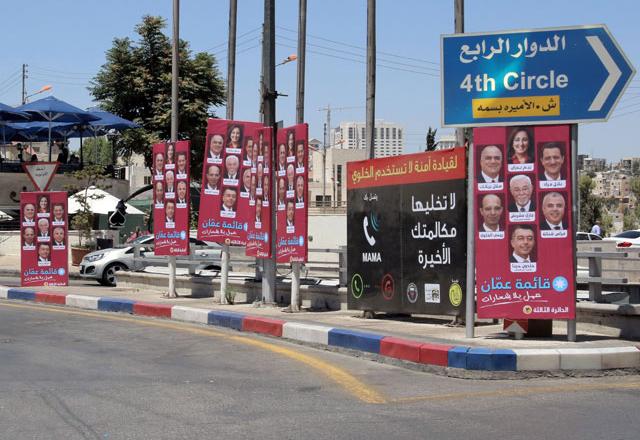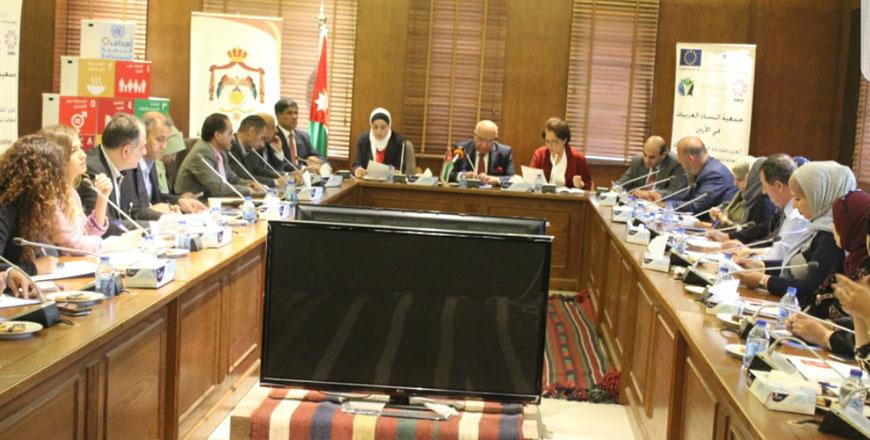You are here
Women activists, MPs seek alliance for gender equality
By Rana Husseini - Mar 06,2017 - Last updated at Mar 06,2017
AMMAN — Women activists and female MPs met on Monday to discuss ways to improve gender equality and the empowerment of women and children in Jordan.
The meeting, held at the Lower House of Parliament in an initiative by the Arab Women Organisation (AWO), was part of the Kingdom’s marking of International Women’s Day on March 8.
On the agenda was the Fifth Goal of the Sustainable Development Global Agenda (SGDA) 2030, which tackles gender equality and the empowerment of women.
The Fifth Goal calls for the elimination of all forms of discrimination and violence against women, human trafficking, sexual abuse, and early and forced marriage.
It also demands the recognition of women’s work in the household and in caring for children, as a step towards ensuring equal responsibility and work in the household.
Another point calls for ensuring gender equality in decision-making positions, as well as in the political, social and public spheres, while ensuring reproductive health services as stipulated in international conventions.
The majority of the female deputies, who attended the meeting with women groups, activists and academics, said they would support the women’s movement’s demands and the recent recommendations by the Royal Committee for Developing the Judiciary and Enhancing the Rule of Law.
The Royal committee recommended the scrapping of the controversial Article 308 of the Penal Code, which allows a sexual assault perpetrator to escape punishment if he marries his victim.
Among the Royal committee’s recommendations was an amendment, long-awaited by women activists, preventing a reduction in punishment if a woman was killed for reasons related to so-called “family honour”.
The committee also recommended an amendment to the Penal Code which would give judges and the courts the discretionary authority to reduce a punishment if the family of the victim decides to drop charges, which is usually applied in crimes and violations committed against women and children.
Laila Naffa, programme director of the AWO, who initiated the meeting, said the idea is to win support from female deputies and to inform them about the SGDA Fifth Goal and discuss ways to implement it.
“Our dialogue with you today is very important and you will be the ones who will carry our demands and voices to the remaining legislators,” Naffa told the gathering.
“We need to constantly meet to discuss achievements and what needs to be done in order to establish a task force to implement the Fifth Goal recommendations,” she added.
Salma Nims, the secretary general of the Jordanian National Commission for Women (JNCW), agreed with Naffa, saying there is an urgent need to meet regularly with female MPs and to update them on the women’s movement’s demands.
Nims also said it is imperative to “distinguish between social norms and religion, because on many occasions, certain individuals and leaders choose social norms over religious teaching when it comes to women’s rights, and this is dangerous”.
Meanwhile, Jerash deputy and head of the Jordanian Women Parliamentarian Forum, Wafaa Bani Mustafa, emphasised the need to “coordinate with the women’s movement and work in a collective manner”.
“We should all unite and support each other so that we can advance with a strong and unified message,” Bani Mustafa stressed.
Zarqa MP Shaha Abu Shosheh also emphasised the need to collaborate with the women’s movement, “because if we don’t support women, who else will?”
Abu Shosheh told representatives that female MPs will lobby their male peers to push for legislative changes “that will work to protect and advance women’s rights and their status in society”.
Karak MP Randa Shaar expressed her opposition to Article 308, saying that allowing a rapist to marry his victim “will eventually lead to the sexual abuse of his wife and the use of her as a commodity”.
Irbid Deputy Intisar Hijazi also touched on early marriage, describing it as a “dangerous phenomenon that needs urgent attention”.
“Many girls are forced to marry at a young age after they are sold by their fathers and uncles in remote areas. This is dangerous and destructive to the girl and her future family,” Hijazi warned.
Islamist Deputy Huda Etoum agreed, saying that “although Sharia [Islamic law] allows early marriage when the girl reaches puberty…we have to look at the consequences of such marriages that usually lead to divorce and at the same time, make sure that we do not violate Sharia rulings”.
On the point of gender equality, Etoum, a Jerash deputy, declared that she was against what she described as “total” equality between men and women.
“I will never agree with total equality between men and women. There are certain roles that are created for men and I surely do not want to perform them,” Etoum told the gathering.
Related Articles
AMMAN — The women’s movement has expressed optimism that some female parliamentary candidates could clinch seats outside the 15-seat designa
AMMAN — Minister of Political and Parliamentary Affairs and Minister of State Musa Maaytah on Monday said the government will cont
AMMAN — The Arab Women Organisation of Jordan (AWO) on Sunday commemorated its 50-year anniversary by pledging to continue working to













